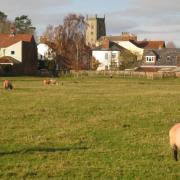THE economy in Yorkshire underwent a seismic upheaval during the last 25 years - and Alan Lewis was at the epicentre. Mr Lewis took over the Illingworth, Morris group in the Eighties, buying out movie star James Mason's first wife Pamela. Ow...
It employed 6,000 people and was symbolic of Yorkshire's proud manufacturing tradition. Despite possessing the world-renowned Crombie menswear brand, the company was ailing. Mr Lewis turned its fortunes around, ensuring a decade and more of profit. Then came globalisation: cheap labour enabled China to grab 80 per cent of the textile sector almost overnight. 'There have been some very dark days,' admitted Mr Lewis.
'I spent six years extricating ourselves from the textile industry, but insisted we kept our assets in Yorkshire. That's been difficult. A lot of people went broke and sold up. 'We kept all the assets, all the land and buildings, in Bradford, Huddersfield, Slaithwaite, Leeds, and what we have done is regenerated these and created a lot more employment, building modern distribution centres.' This radical turnaround was an undoubted risk. 'It's worked fantastically well,' says Mr Lewis. 'It's been hard work to get it off the ground because there wasn't a lot of confidence at first.' Now though, with his Hartley Property Trust going from strength to strength, there is confidence aplenty.
Many of its developments are based at the former textile sites, like the planned residential transformation of both Kirkheaton Mills at Huddersfield and Slaithwaite's Globe Mills. Commercial property is also key: the Hartley Business Parks in West Yorkshire have one million square feet of warehousing capacity. Crombie, meanwhile, has been reinvented as a retail group. The first ladies' collection was launched in Yorkshire in 2000, and there are 24 Crombie shops in places like Sheffield Meadowhall and Hull, London, Cardiff and Edinburgh. More are in the pipeline.
'Crombie asked to move to London, but we think its heritage is either in Scotland or Yorkshire,' Mr Lewis said. The retailers' HQ stayed in Leeds. 'If you look at our heritage it goes back to 1805. We ran the blockade in the southern states of America to provide the Confederate officers with uniforms. We flew balloons over Paris when it was under Prussian siege to get our orders through.' Alan Lewis W C Fields put it this way: 'Horse sense is the thing a horse has which keeps it from betting on people.' After a few hours in the company of both at Beverley you could see his point.
A sensible horse would rather canter through life than run on behalf of humans, shredding their nerves in the process. Could it be that thoroughbreds are temperamental because they're working with the angst-ridden? This happens. In the days and minutes up to Beverley's first evening meeting of the season, racecourse manager Sally Iggulden was taking calls from stressed trainers whose lives are at the mercy of the weather's impact on turf.
This was Wednesday and since Sunday Amanda Perrett had hardly been off the phone from Sussex. She wanted rain and soft ground for her horse in the 6.20. On the Frankie Dettori failed to start, a couple of long-shots came good and the Queen won �461 - all part of the evening's drama at Beverley Races. John Woodcock reports Photographs: Andy Bulmer Above: Smugglers Bay in the parade ring Right: Running up to the startother line, Mark Wallace in Newmarket was desperate for it to stay dry for his runner. They both lost. After a weather report at dawn Perrett abandoned plans to bring her gelding north, while Wallace's filly, even with conditions in her favour, could finish only 10th. Beverley's management had its own reasons for casting nervous glances at the sky, and TV coverage of an afternoon meeting.
'Oh no, where's that?' groaned chairman Charles Maxsted when he saw the mud, and punters beneath umbrellas. If the rain at Cartmel reached the East Riding it would hit the evening's attendance, on top of another setback - star attraction Frankie Dettori had cancelled his four scheduled rides in order to be fully fit for the Epsom Derby. In the racecard Maxsted had already expressed remorse for a blunder at a meeting the previous weekend.
'I must apologise to everyone for the lack of the Big Screen on the day. We had in fact ordered a bigger one than normal and it was infuriating to hear that the driver had inadvertently been sent to Catterick, who had not even ordered one!' These are snapshots of anxieties which afflict the sport. And they come thick and fast when the actual racing starts. Right: The Jockeys Loft Below: Steward, Liz VerityThe Queen can't need the prize-money but as the owner, she would have preferred it if her three-year-old gelding Bachnagairn had won the Supabed Quality Paper Bedding Handicap Stakes instead of finishing third and earning her a measly �461.
After the next contest the Beverley stewards were on the case. They asked the trainer to explain the improved running of Snow Dancer who, at a starting price of 33-1 defeated 16 rivals, having lost her previous race by 18 lengths. They say that's racing, or not in the case of Dragon Flower in the 8.50, a proper little madam this one. She'd travelled 230 miles from her stable in Berkshire, but refused to run over seven furlongs as dusk fell and a cloud-streaked moon began to appear over Westwood. She lost her jockey, ducked under the starting stall, dug in her hooves, and wanted nothing to do with bookmakers, gamblers or the job she's been trained to do.
The stewards were concerned again, and sought an explanation from her connections for Dragon Flower's wayward behaviour. Beverley has witnessed many such dramas in its time, more probably than any course in Yorkshire because it's the oldest original site in the county still staging meetings. They began in 1690 when enthusiasts gathered in the town's Tiger Inn, and a subscription list opened to finance the building of a grandstand. The area had been given an appetite for racing by the extraordinary Kiplingcotes Derby, reputed to be the oldest flat race in England, dating back to 1519, 1555, 1619, or 1669 depending on which records are consulted.
It still takes place on the third Thursday in March over a four-mile course of lanes and tracks on the Wolds, starting at a point not that far from Beverley's finishing post. More turf history is even closer. The first pub westbound from the course is the Altisidora at Bishop Burton, namedafter the winner of the St. Leger in 1813 and trained in the village by Squire Watt. Keep going west and the churchyard at Pocklington is the resting place of Jim Snowden, a wayward but great jockey of his day. He won the Derby and three other Classics but his liking for the bottle made him forgetful. He once turned up for Chester Races a week late, and missed another winning Derby ride through drink. When he died near Doncaster in 1889 he had a �288 cheque for riding fees in his pocket.
At that time there were numerous trainers in the East Riding (among their triumphs was a Grand National winner), but now there's only one, and a single course, 'Beverley Races, the greatest of places!' claims its slogan. Not even Hull could sustain a track, which doesn't surprise Sally Iggulden. Her research shows that relatively few Hull people are among Beverley's race goers. 'We think it's because football and rugby league are so dominant in the city there's not much passion left for racing.'
There is, though, plenty of support from elsewhere, including the pasturemasters - the freemen who administer things on the common land of which the course is a part. Beverley's annual turnover is around �2m and this year it aims to have 100,000 visitors through the turnstiles - a landmark in modern times - because this season there is racing on a record 21 days. Facilities are already among the best, but with a nod to the past. The Rapid Lad Bar pays tribute to a horse which won 12 times there during the 1980s, reigning supreme on the uphill home straight, but was a loser wherever else it ran.
The tourist department says the races are the town's biggest attraction after the Minster, 'and we aim to reverse that,' said Sally, relishing the challenge. She's worked at Ascot, was the youngest course manager in the country when she arrived at Beverley seven years ago, and is still the only woman in the job in Yorkshire. To be paid to manage her hobby, as she sees it, is a privilege. 'For me racing is a win-win situation.' And very few can say that.
• For details of racing at Beverley 01482 867488/882645 www.beverley-racecourse.co.uk


























